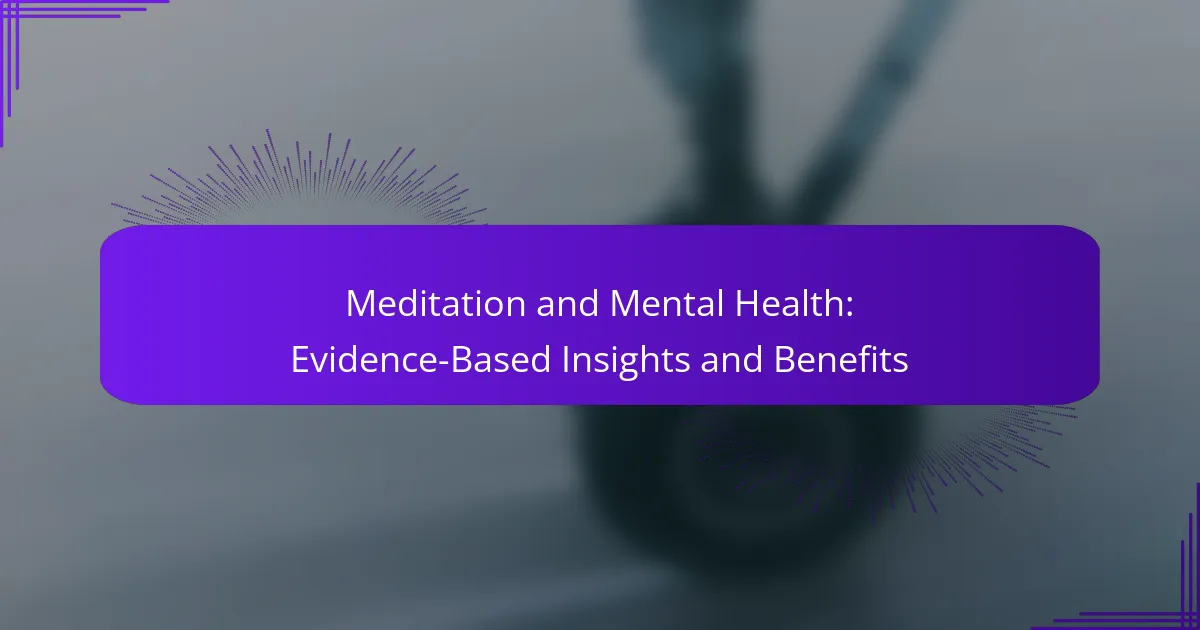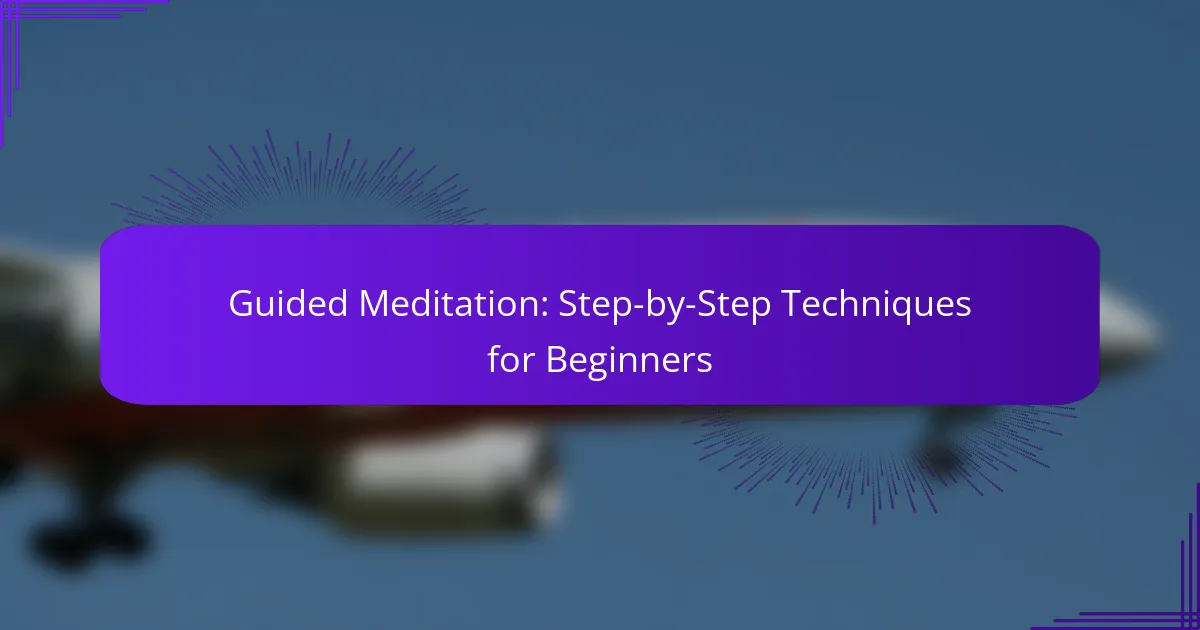Meditation has emerged as a powerful tool for enhancing mental health, offering evidence-based benefits such as reduced stress and improved emotional regulation. By fostering relaxation and promoting a healthier mindset, regular meditation practice can significantly enhance overall psychological well-being. Various techniques, including mindfulness and transcendental meditation, provide unique approaches to managing thoughts and emotions effectively.
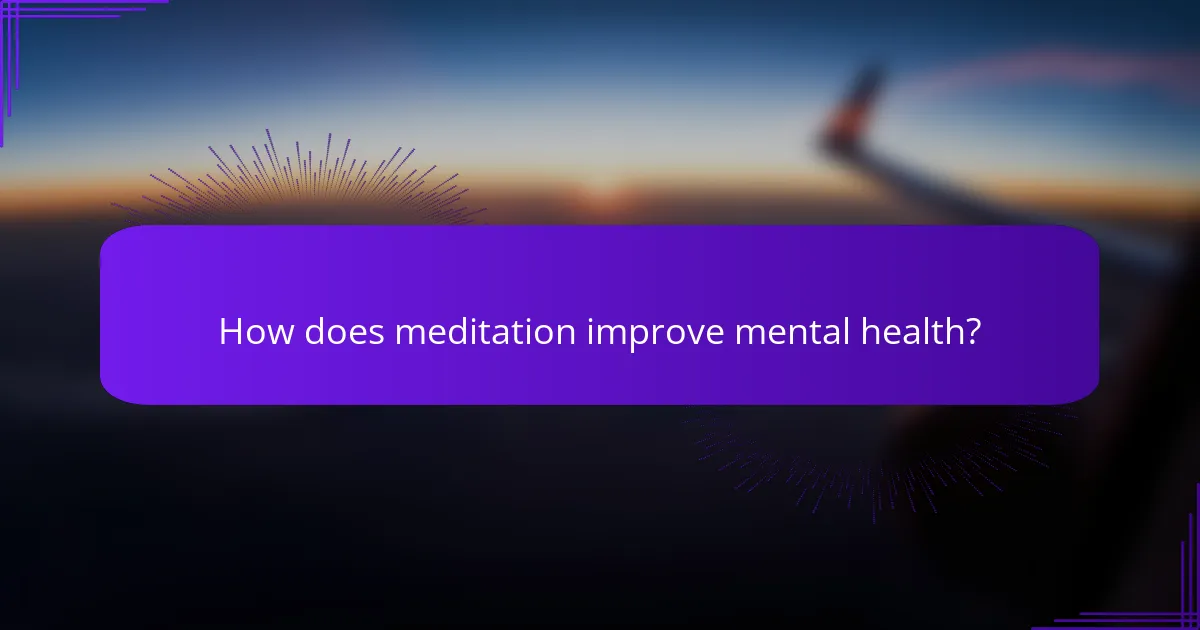
How does meditation improve mental health?
Meditation improves mental health by promoting relaxation and reducing stress, which can lead to significant improvements in emotional well-being. Regular practice can help individuals manage their thoughts and feelings more effectively, fostering a healthier mindset.
Reduces anxiety symptoms
Meditation has been shown to reduce anxiety symptoms by encouraging mindfulness and present-moment awareness. Techniques such as focused breathing and body scans can help individuals detach from anxious thoughts and cultivate a sense of calm.
Practicing meditation for even a few minutes daily can lead to noticeable reductions in anxiety levels over time. Many people find that guided meditations or apps can provide structure and support as they develop their practice.
Enhances emotional regulation
Through meditation, individuals can enhance their emotional regulation by increasing their awareness of emotional triggers and responses. This heightened awareness allows for better management of emotions, leading to more balanced reactions in challenging situations.
For example, mindfulness meditation can help individuals pause before reacting emotionally, allowing for more thoughtful responses. Regular practice can lead to improved resilience and a greater ability to cope with stressors.
Improves overall well-being
Meditation contributes to improved overall well-being by promoting a positive mindset and reducing negative thought patterns. Regular practitioners often report feeling more content, focused, and connected to themselves and others.
Incorporating meditation into daily routines can lead to long-term benefits, such as better sleep quality and enhanced relationships. Simple practices, like starting or ending the day with a few minutes of meditation, can significantly impact one’s mental health and happiness.
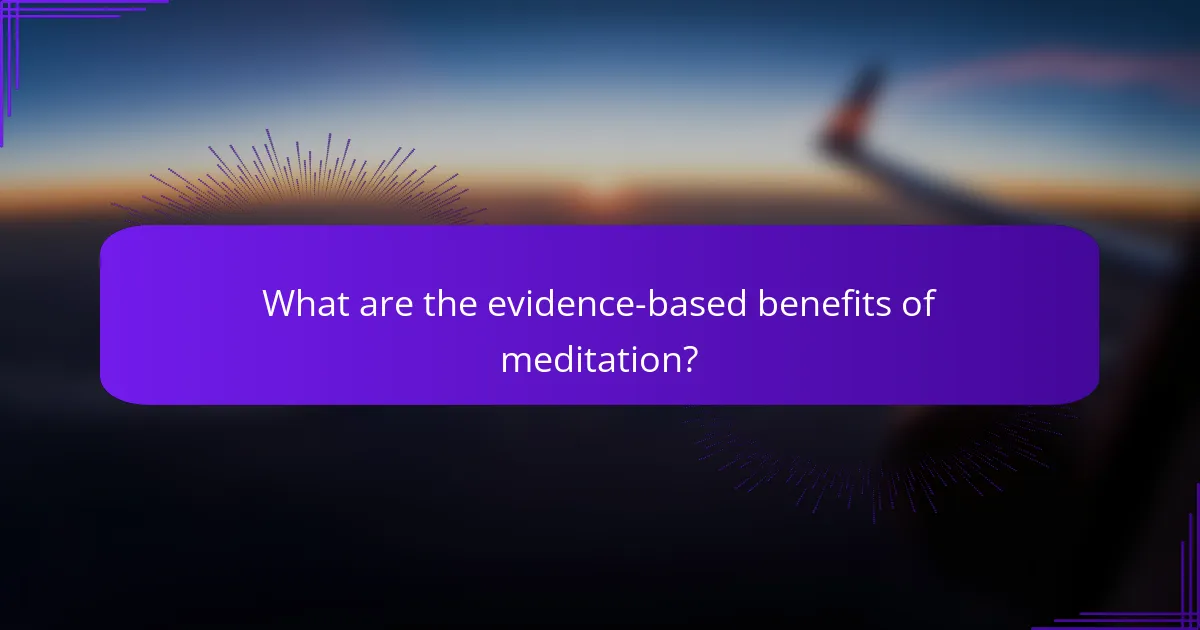
What are the evidence-based benefits of meditation?
Meditation offers a range of evidence-based benefits for mental health, including reduced stress, improved emotional regulation, and enhanced focus. These benefits stem from various scientific studies that highlight meditation’s positive impact on psychological well-being and cognitive function.
Scientific studies support effectiveness
Numerous scientific studies have demonstrated the effectiveness of meditation in improving mental health. Research indicates that regular meditation practice can lead to significant reductions in anxiety and depression symptoms, with many participants reporting improved overall mood and emotional stability.
For instance, meta-analyses have shown that mindfulness meditation can decrease anxiety levels by approximately 30-40% in clinical populations. These findings suggest that incorporating meditation into daily routines can be a valuable tool for managing mental health challenges.
Neuroscientific findings on brain changes
Neuroscientific research has revealed that meditation can induce structural and functional changes in the brain. Studies using brain imaging techniques have found increases in gray matter density in areas associated with emotional regulation, self-awareness, and stress response.
For example, participants who engaged in mindfulness meditation showed increased activity in the prefrontal cortex, which is linked to higher-order thinking and decision-making. These brain changes support the idea that meditation not only benefits mental health but also enhances cognitive abilities over time.
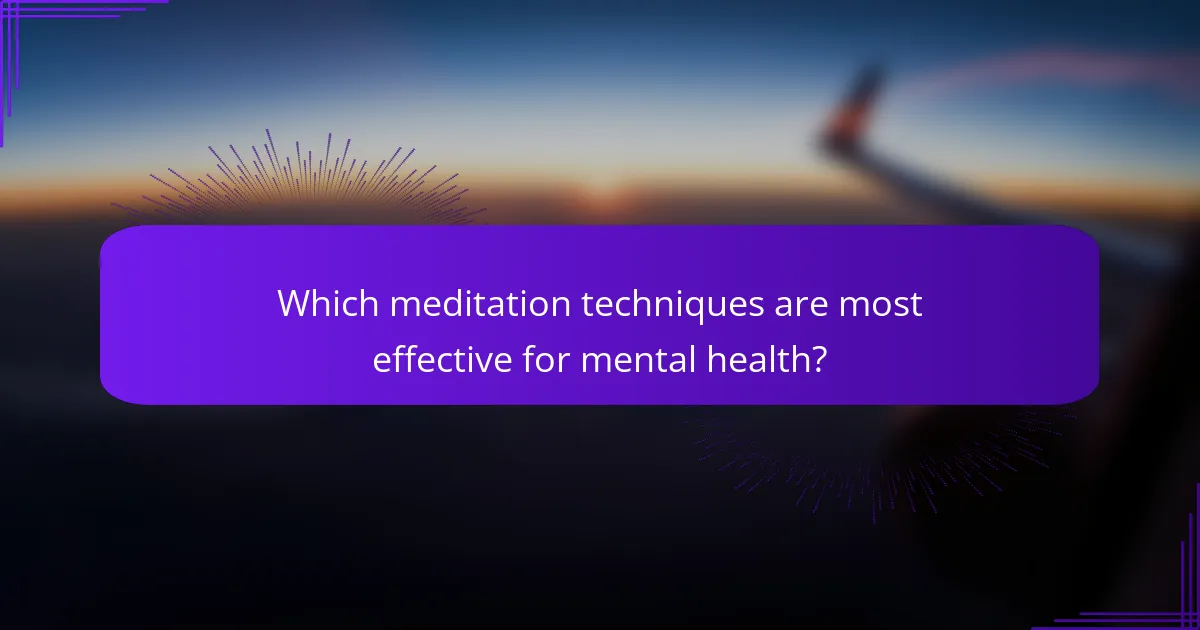
Which meditation techniques are most effective for mental health?
Several meditation techniques have shown effectiveness in improving mental health, with mindfulness meditation, transcendental meditation, and guided imagery being among the most researched. Each method offers unique approaches that can help reduce stress, anxiety, and depression while enhancing overall well-being.
Mindfulness meditation
Mindfulness meditation focuses on being present in the moment and observing thoughts and feelings without judgment. This technique typically involves paying attention to the breath or bodily sensations, which can help individuals develop greater awareness and emotional regulation.
Practicing mindfulness can be done in sessions ranging from a few minutes to an hour, and it can be integrated into daily activities. Common pitfalls include getting distracted or feeling frustrated when thoughts arise; however, acknowledging these distractions is part of the practice.
Transcendental meditation
Transcendental meditation (TM) is a form of silent mantra meditation that aims to promote deep relaxation and reduce stress. Practitioners typically meditate for about 15-20 minutes twice a day, using a specific mantra to help focus the mind and transcend ordinary thought.
TM is often taught through certified instructors, which can involve a financial commitment. While many find it beneficial, it may not suit everyone, especially those who prefer more structured or guided practices.
Guided imagery
Guided imagery involves using mental visualization to promote relaxation and mental clarity. This technique often includes listening to a facilitator who guides the individual through a series of calming images or scenarios, helping to reduce anxiety and enhance emotional well-being.
Sessions can vary in length but typically last between 10 to 30 minutes. It’s essential to find a comfortable and quiet space for practice. Beginners may benefit from using recorded sessions or apps, while experienced practitioners can create their own imagery scripts.
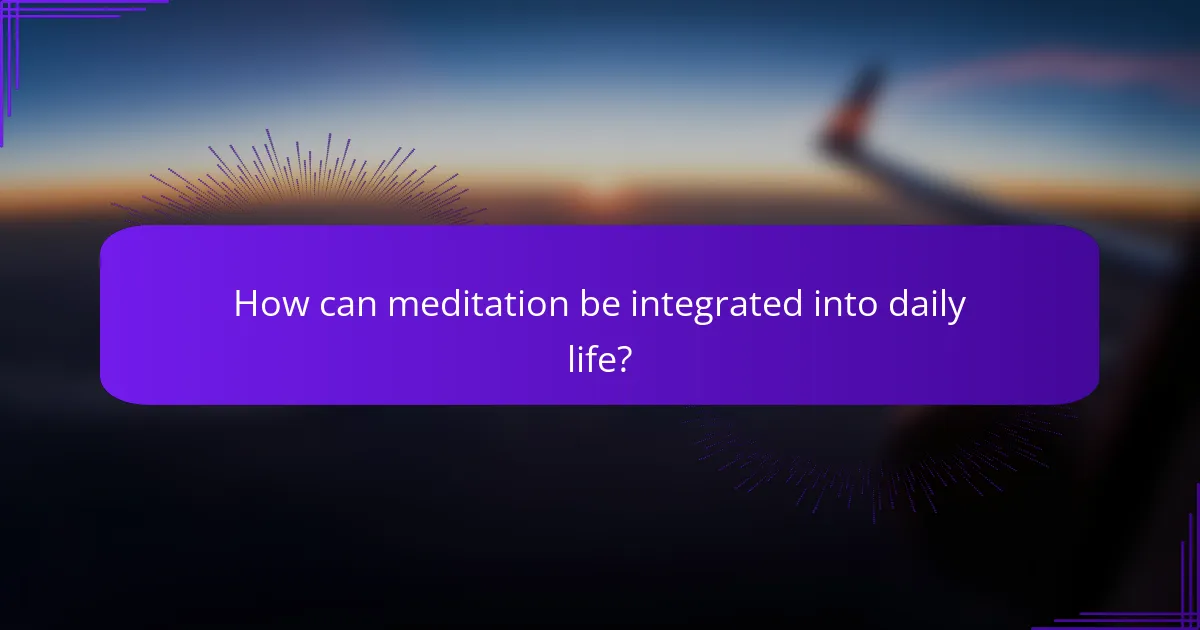
How can meditation be integrated into daily life?
Meditation can be seamlessly incorporated into daily routines by setting aside specific times for practice and utilizing available resources. Consistency is key, whether through short sessions in the morning or evening or integrating mindfulness into everyday activities.
Daily practice routines
Establishing a daily meditation routine can enhance mental well-being. Aim for at least 5 to 20 minutes each day, gradually increasing the duration as you become more comfortable. Morning sessions can set a positive tone for the day, while evening practices help unwind and reflect.
Consider different styles, such as mindfulness, loving-kindness, or body scan meditation, to find what resonates with you. Consistency is more important than duration; even a few minutes can be beneficial if practiced regularly.
Apps for guided meditation
Numerous apps offer guided meditation to help users stay focused and motivated. Popular options include Headspace, Calm, and Insight Timer, each providing various sessions tailored to different needs, such as stress relief, sleep improvement, or enhanced focus.
When choosing an app, consider factors like user interface, session length, and specific features such as progress tracking or community support. Many apps offer free trials, allowing you to explore before committing to a subscription.
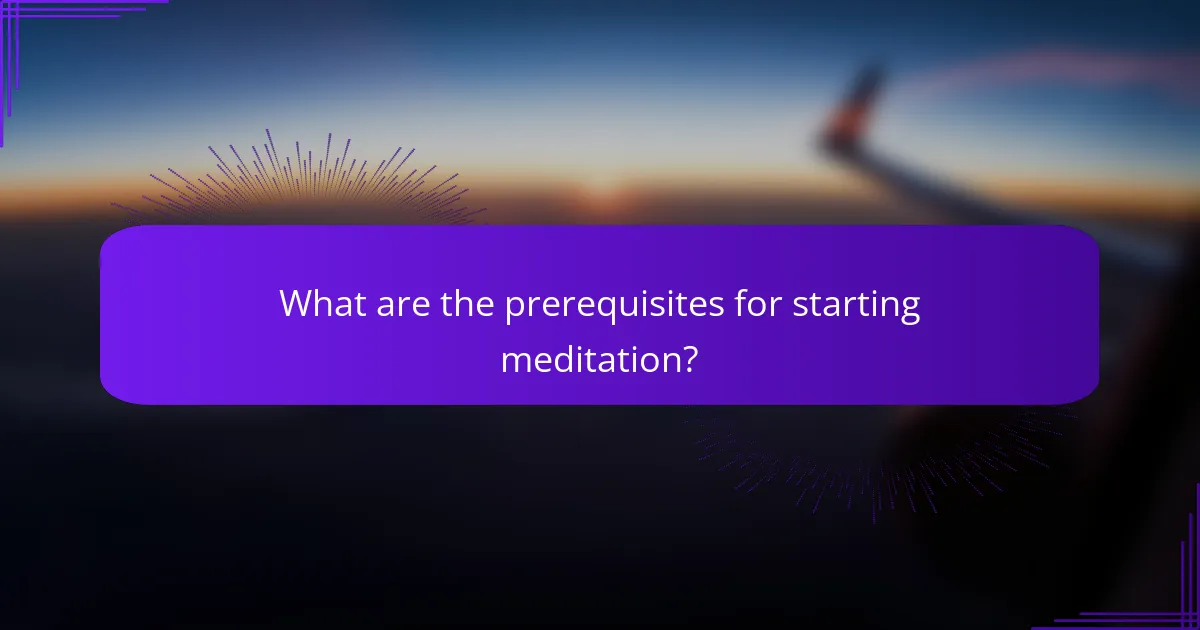
What are the prerequisites for starting meditation?
To start meditation, you need a willingness to engage in the practice and a basic understanding of its techniques. Familiarity with different meditation styles can also enhance your experience and help you choose the right approach for your needs.
Creating a conducive environment
A supportive environment is crucial for effective meditation. Choose a quiet space where you can sit comfortably without distractions. Consider using items like cushions, blankets, or even soft lighting to enhance your comfort.
Minimize interruptions by turning off electronic devices or using noise-canceling headphones. If possible, designate a specific area in your home for meditation to help establish a routine.
Understanding personal goals
Clarifying your personal goals for meditation can guide your practice. Whether you seek stress relief, improved focus, or emotional balance, knowing your objectives helps tailor your approach. Start by reflecting on what you hope to achieve.
Set realistic expectations and remember that meditation is a skill that develops over time. Tracking your progress can provide motivation and insight into how your practice aligns with your goals.
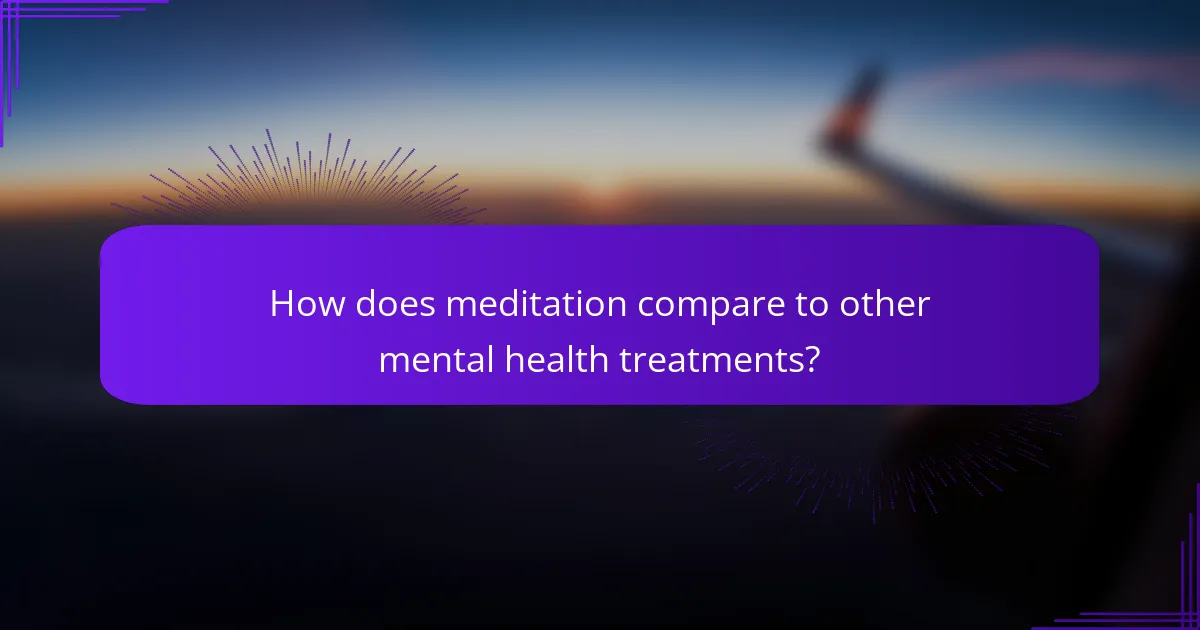
How does meditation compare to other mental health treatments?
Meditation can serve as a valuable addition to traditional mental health treatments, offering unique benefits that complement therapy and medication. While it may not replace these methods entirely, it can enhance overall mental well-being and support recovery.
Complementary to therapy
Meditation can enhance the effectiveness of therapy by promoting mindfulness and emotional regulation. When integrated with cognitive-behavioral therapy (CBT) or other therapeutic approaches, meditation helps individuals develop greater self-awareness and resilience.
Practicing meditation regularly may lead to improved focus during therapy sessions and a deeper understanding of personal triggers. This synergy can result in more effective coping strategies and a stronger therapeutic alliance between the individual and their therapist.
Cost-effectiveness vs. medication
Meditation is often more cost-effective than medication, as it requires minimal resources and can be practiced anywhere. While medications may incur ongoing costs and potential side effects, meditation typically involves no financial investment beyond initial learning resources.
Many individuals find that meditation can reduce their reliance on medication, leading to significant savings over time. For those considering meditation as a supplement to their mental health treatment, it is advisable to consult with a healthcare provider to ensure a balanced approach.
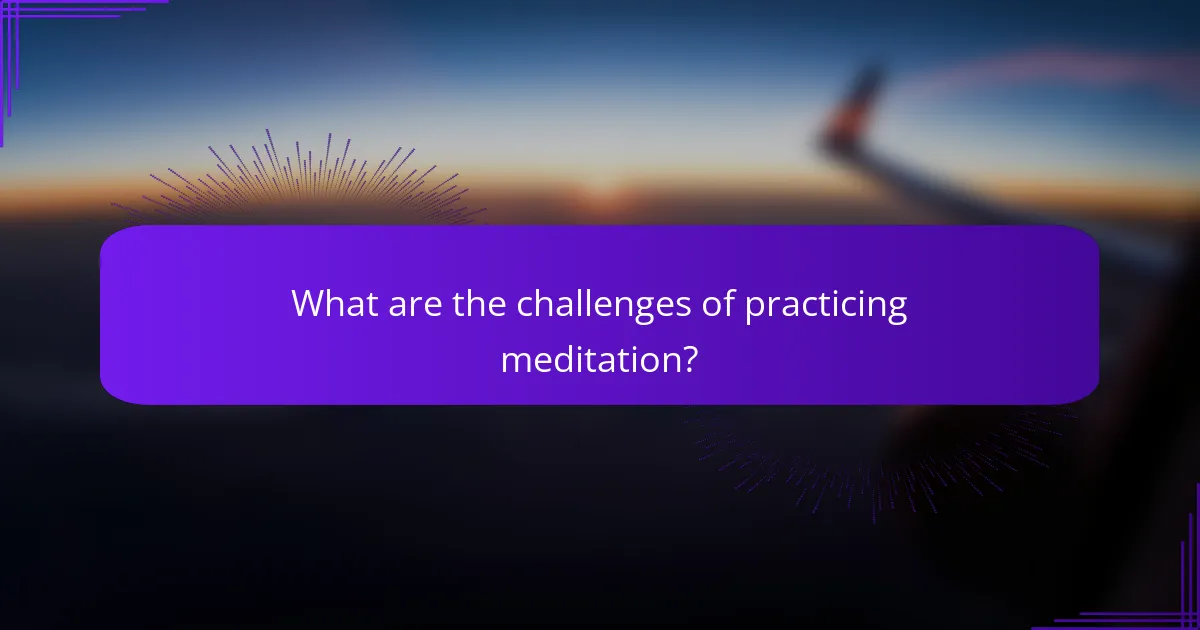
What are the challenges of practicing meditation?
Practicing meditation can present several challenges that may hinder progress and consistency. Common obstacles include difficulty in maintaining focus, finding the right time and space, and managing expectations about the experience.
Common misconceptions
One prevalent misconception is that meditation requires a completely empty mind. In reality, it’s normal for thoughts to arise; the goal is to acknowledge them without judgment and gently return to the breath or focal point.
Another myth is that meditation must be practiced for long durations to be effective. Even short sessions, ranging from five to ten minutes, can yield significant benefits, especially for beginners.
Many believe that meditation is only for those seeking spiritual enlightenment. However, it is widely recognized for its mental health benefits, making it accessible and beneficial for anyone looking to reduce stress or improve focus.
